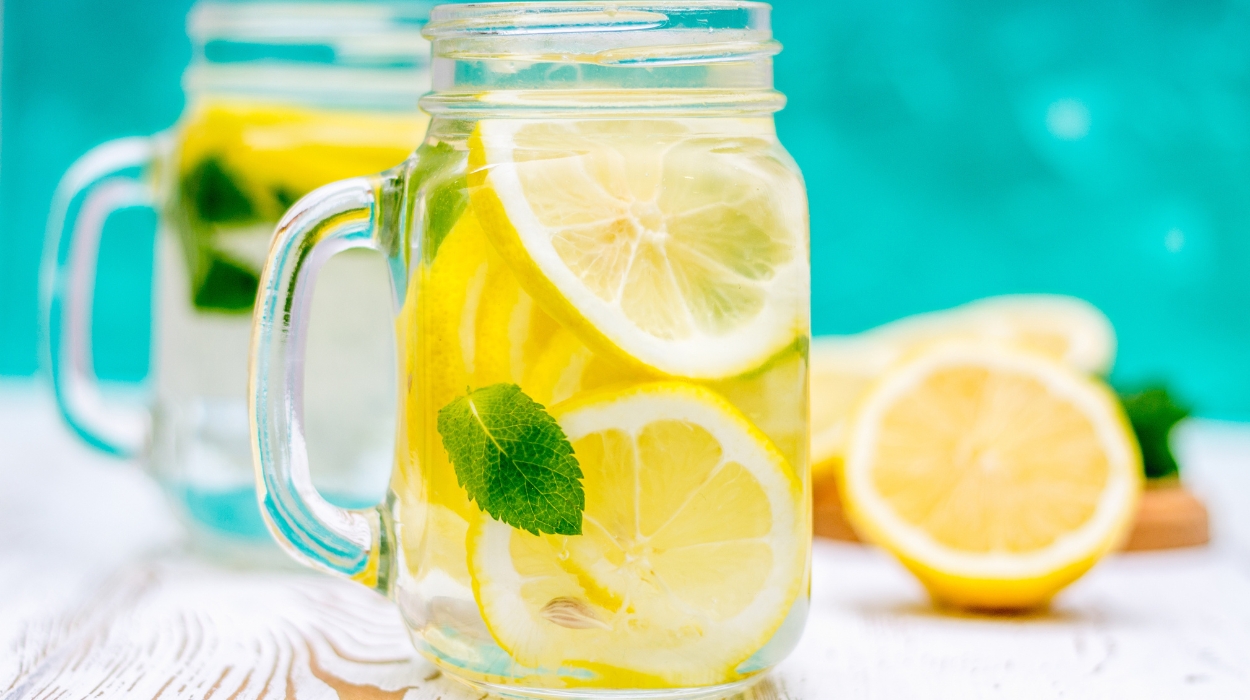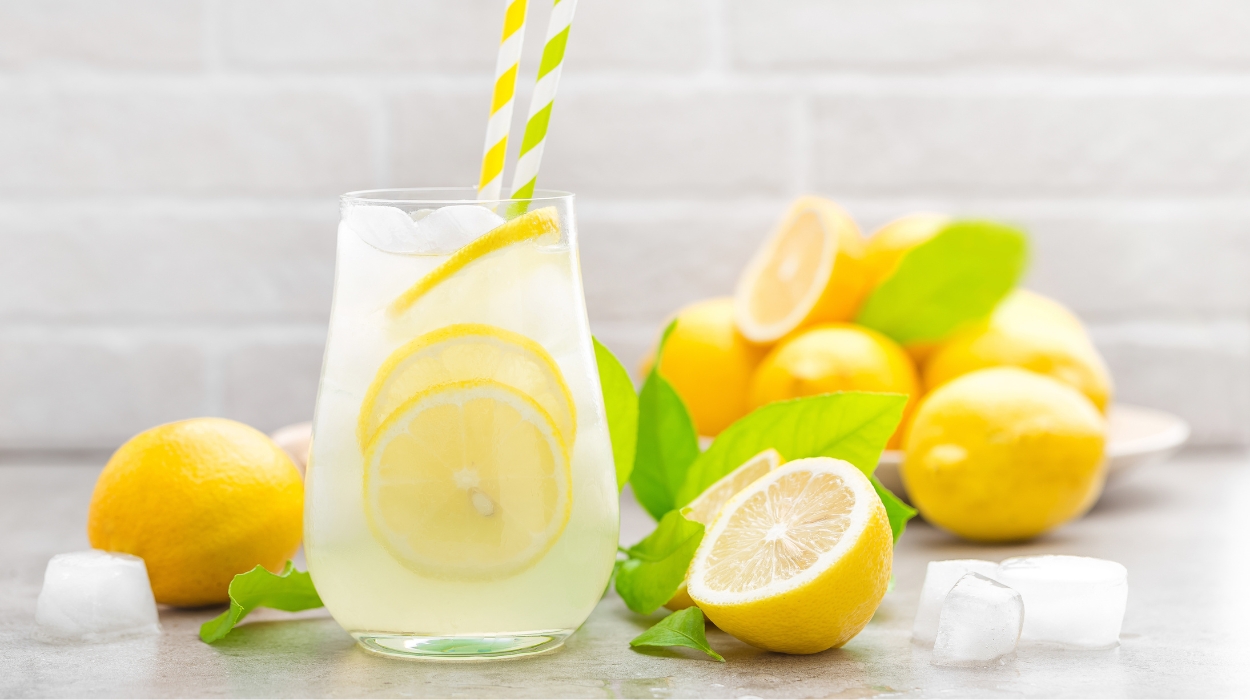 Expert's opinion
Expert's opinion
Expert's opinion
The article is a subjective view on this topic written by writers specializing in medical writing.
It may reflect on a personal journey surrounding struggles with an illness or medical condition, involve product comparisons, diet considerations, or other health-related opinions.
Although the view is entirely that of the writer, it is based on academic experiences and scientific research they have conducted; it is fact-checked by a team of degreed medical experts, and validated by sources attached to the article.
The numbers in parenthesis (1,2,3) will take you to clickable links to related scientific papers.
Does Lemon Water Help You Lose Weight? Here’s The Answer 2024

The touted benefits of drinking lemon water are numerous, from aiding in weight loss regimen to improving digestion and more. But is there strong scientific evidence to support these claims? In particular, does lemon water help you lose weight? Is it an effective fat burner?
Short answer: maybe.
While lemon water, or any so-called detox water, may not be a magic solution to promote weight loss, it can still be a healthy addition to a weight-loss diet.
This article discusses the potential benefits of lemon water for weight loss and examines what the current scientific research says about this popular claim. It also discusses how to incorporate lemon water into your diet, as well as potential risks and possible side effects to keep in mind.
Does Lemon Water Help You Lose Weight?
While drinking lemon water alone is unlikely to result in significant weight loss, incorporating it into a reduced-calorie diet may boost your weight loss efforts.
Lemon water is a healthy substitute for high-calorie, sugary drinks, and some evidence suggests that it can help with increased satiety, boost metabolism, and support hydration, potentially leading to weight loss goals achievement.
Lemon Water And Weight Loss: What Is The Link?
Low In Calories

Lemon water is low in calories and can serve as a healthy alternative to sugary beverages like soda or juice.
A 16-ounce bottle of cola[2] has approximately 207 calories. Replacing sugary drinks with the low-calorie beverage lemon water can help reduce your daily calorie intake, potentially promoting weight loss. And if you’re not keen on drinking plain water, lemon water can be a healthful alternative to encourage you to drink more water.
Minimizes Water Weight
Lemon juice[3] is also a diuretic that helps increase urine output and reduce water weight gain and bloating. When your body holds on to excess water, it can make you feel heavier than you actually are.
May Enhance Satiety
In addition, lemon water before meals may help promote satiety. According to a 2018 study,[4] pre-meal water consumption is linked to a significant reduction in young adults’ total calorie intake.
May Increase Calories Burned
Lastly, drinking water can increase the number of calories your body burns each day by inducing thermogenesis,[5] or the process of heat generation.
So does drinking lemon water help you lose weight?
We aren’t saying lemon water is the magic solution for your weight loss journey. However, when paired with a healthy diet that includes foods for weight loss, it may be helpful to get the scale moving in the right direction.
What Is Lemon Water?
Lemon water is a beverage made by mixing fresh lemon juice with regular water. It can be enjoyed hot or cold and is often consumed early in the morning to start the day on a healthy note.
Lemon Nutrition Facts
One glass of lemon water containing one small squeezed lemon[1] contains:
- Energy: 10.6 kilocalories
- Protein: 0.1 gram
- Carbohydrates: 3.3 grams
- Sugar: 1 gram
- Vitamin C: 18.6 milligrams, or 21% of the Daily Value
- Folate: 9.6 micrograms, or 2% of the DV
How To Make Lemon Water For Weight Loss?

Lemon water is fairly simple to make. Here are the steps to follow:
- Squeeze fresh lemon juice: Cut half a lemon and squeeze the juice into a glass. You can use a citrus juicer or your hands to extract the juice.
- Add water: Fill the glass with warm, room temperature, or cold water, depending on your preference.
- Stir and enjoy.
Does warm lemon water help you lose weight faster? There is currently no solid evidence to suggest that warm lemon water is better than cold lemon water for weight loss. It is entirely up to you to choose the temperature of your water.
If you dislike plain lemon water’s taste, add a bit of turmeric or a few fresh mint leaves for added flavor.
Other Health Benefits Of Lemon Water
In addition to its potential weight loss benefits, lemon water has several other overall health benefits.
Supports Healthy Digestion
Enjoying a glass of lemon water before meals may help support healthy digestion. This is because lemons contain citric acid, which increases gastric acid secretion.[6] This can help your body break down and digest food more quickly.
One 2021 study[7] found that consuming 300 milliliters of lemon water before meals promoted peristalsis, or the contraction of muscles in the digestive tract that helps move food through the digestive system.
Increases Hydration
Many of us struggle to consume enough water each day. Dehydration can cause symptoms[8] such as dry mouth, thirst, headache, and lethargy.
Lemon juice can help enhance the flavor of plain water, making it easier to meet your daily water intake and prevent dehydration.
Furthermore, some animal research suggests that increased hydration[9] is associated with a loss of body weight, potentially through an increase in metabolism.
High In Vitamin C
One glass of lemon water contains 18.6 milligrams[1] or about 21% of the DV for vitamin C.
Vitamin C[10] is a powerful antioxidant that can help protect the body from damage caused by free radicals. It plays a crucial role in supporting the immune system’s health, which helps protect us from becoming ill.
Vitamin C is also important for producing collagen, a structural protein found in your connective tissues, tendons, skin, bones, and cartilage.
Lastly, getting enough vitamin C can help improve the absorption of non-heme iron found in plant-based foods.
May Help Prevent Kidney Stones
Lemon water is believed to be protective against kidney stones because it contains citric acid, which can help prevent the formation of calcium oxalate stones.
A 2022 study found that adding fresh lemon juice to a diet with reduced amounts of animal proteins and sodium may be more protective against calcium oxalate stone recurrence[11] than the same diet without lemon juice supplementation.
The National Kidney Foundation recommends mixing 4 ounces of lemon juice concentrate with water daily as a complementary dietary remedy for kidney stone prevention.
Potential Side Effects
Lemon water is generally considered safe for most healthy individuals. However, it may cause some side effects in certain people.
Fresh lemon juice is highly acidic. Drinking lemon juice can erode tooth enamel, causing tooth sensitivity, decay, and discoloration.[12] Mix your lemon juice with water to prevent dental erosion, and drink lemon water through a straw. Rinse your mouth with plain water after consuming lemon water.
Furthermore, due to its high acidity, lemon water may worsen symptoms[13] in people with gastroesophageal reflux disease, or GERD.
The Takeaway
There is some evidence that lemon water may help increase satiety, boost your metabolism, and increase weight loss when combined with a healthy diet. However, it’s unlikely that you will lose a significant amount of weight or burn fat solely from adding lemon juice to your diet.
Additionally, lemon water can boost your daily vitamin C intake, which can help support a healthy immune system and improve iron absorption from plant sources. Regular lemon water consumption can also help you stay hydrated, improve digestion, and protect against kidney stones.
+ 13 sources
Health Canal avoids using tertiary references. We have strict sourcing guidelines and rely on peer-reviewed studies, academic researches from medical associations and institutions. To ensure the accuracy of articles in Health Canal, you can read more about the editorial process here
- Usda.gov. (2023). FoodData Central. [online] Available at: https://fdc.nal.usda.gov/fdc-app.html#/food-details/167747/nutrients
- Usda.gov. (2023). FoodData Central. [online] Available at: https://fdc.nal.usda.gov/fdc-app.html#/food-details/174852/nutrients
- Shilpa Tejpal, Wemyss, A.M., Bastie, C.C. and Klein-Seetharaman, J. (2020). Lemon Extract Reduces Angiotensin Converting Enzyme (ACE) Expression and Activity and Increases Insulin Sensitivity and Lipolysis in Mouse Adipocytes. Nutrients, [online] 12(8), pp.2348–2348. doi:https://doi.org/10.3390/nu12082348.
- Jeong, J. (2018). Effect of Pre-meal Water Consumption on Energy Intake and Satiety in Non-obese Young Adults. Clinical Nutrition Research, [online] 7(4), pp.291–291. doi:https://doi.org/10.7762/cnr.2018.7.4.291.
- Ashok, V. and Joshi, A. (2013). Effect of ‘Water Induced Thermogenesis’ on Body Weight, Body Mass Index and Body Composition of Overweight Subjects. Journal of Clinical and Diagnostic Research. [online] doi:https://doi.org/10.7860/jcdr/2013/5862.3344.
- Freitas, D., François Boué, Mourad Benallaoua, Gheorghe Airinei, Benamouzig, R., Lutton, E., Jourdain, L., Dubuisson, R.-M., Maître, X., Luc Darrasse and Steven Le Feunteun (2022). Glycemic response, satiety, gastric secretions and emptying after bread consumption with water, tea or lemon juice: a randomized crossover intervention using MRI. European journal of nutrition, [online] 61(3), pp.1621–1636. doi:https://doi.org/10.1007/s00394-021-02762-2.
- Seronijihou.com. (2022). International Medical Journal. [online] Available at: https://www.seronijihou.com/article/effects-of-citric-acid-in-lemon-water-on-the-human-intestinal-microbiota-a-comparison-between-pre-meal-intake-of-water-and-lemon-water.
- Shaheen, N.A., Alqahtani, A.A., Hussam Assiri, Rayan Alkhodair and Hussein, M. (2018). Public knowledge of dehydration and fluid intake practices: variation by participants’ characteristics. BMC Public Health, [online] 18(1). doi:https://doi.org/10.1186/s12889-018-6252-5.
- Thornton, S.N. (2016). Increased Hydration Can Be Associated with Weight Loss. Frontiers in Nutrition, [online] 3. doi:https://doi.org/10.3389/fnut.2016.00018.
- Nih.gov. (2020). Office of Dietary Supplements – Vitamin C. [online] Available at: https://ods.od.nih.gov/factsheets/VitaminC-HealthProfessional/
- Piero Ruggenenti, Maria Gabriella Caruso, Cortinovis, M., Perna, A., Tobia Peracchi, Giuliano, G., Stefano Fogelberg Rota, Brambilla, P., Giuliana Invernici, Villa, D., Diadei, O., Matias Trillini, Natali, G. and Remuzzi, G. (2022). Fresh lemon juice supplementation for the prevention of recurrent stones in calcium oxalate nephrolithiasis: A pragmatic, prospective, randomised, open, blinded endpoint (PROBE) trial. EClinicalMedicine, [online] 43, pp.101227–101227. doi:https://doi.org/10.1016/j.eclinm.2021.101227.
- Mosaico, G. and Cinzia Casu (2018). Particular dental erosion. The Pan African medical journal, [online] 30. doi:https://doi.org/10.11604/pamj.2018.30.190.16196.
- and, D. (2023). Eating, Diet, & Nutrition for GER & GERD. [online] National Institute of Diabetes and Digestive and Kidney Diseases. Available at: https://www.niddk.nih.gov/health-information/digestive-diseases/acid-reflux-ger-gerd-adults/eating-diet-nutrition



